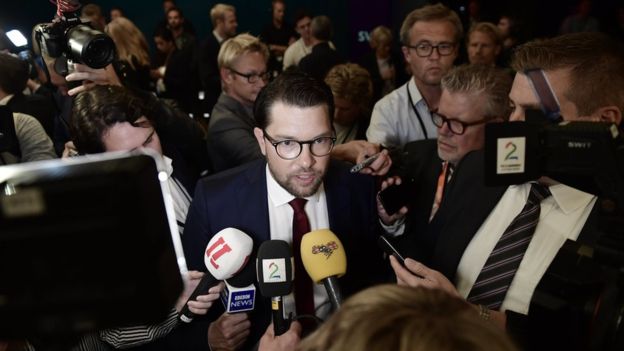The composition of Sweden’s next government has been thrown into severe doubt following the results of the country’s parliamentary elections, which have left the two main political blocs almost tied. Each is around thirty seats short of an overall majority, with the remaining seats made up by the rising far-right Sweden Democrats party. Both blocs are uneasy about forming an alliance.
To make sense of the results, it is important to understand how Swedish politics works, and is different from our own here in the UK. Most of the major political parties in Sweden are organised into large-scale, long-term alliances or blocs, which can be thought of as a bit like pre-made coalitions. Although voters still opt for an individual party, with specific values and views which are distinctive from any other, they are also in practice voting for the bloc of which that party is a member. The leader of the largest party in the winning bloc conventionally wins the office of Prime Minister, meaning that in essence voters who back smaller parties in these blocs are supporting a Prime Minister hailing from a party other than their own.

Still with me? Good. Of the two current blocs, one (‘Red-Green’) is left-leaning and led by the Social Democratic Party, perennially the largest single party in Swedish politics, who are currently in power under Prime Minister Stefan Löfven. The other bloc, ‘Alliance’, is led by the Moderate Party and ideologically is of a centre-right persuasion. The bloc system, however, has been shaken up in recent years by the rise of the anti-immigration Sweden Democrats, who have not affiliated with either side, but have made steady gains since the beginning of the decade.
That brings us to this election. In the months leading up to it, there was a lot of hype about the potential gains to be made by the Sweden Democrats. Following the apparent trend for far-right parties’ increasing popularity throughout western Europe, many expected big things of the Sweden Democrats, with some saying they could receive an unprecedented 30% of the vote as voters moved away from the centre ground. Such a result never quite materialised for the party. They made substantial gains, winning 13 seats to take their overall total to 62, but fell some way short of a result that would have overhauled the political system, as some predicted.
Elsewhere, there were also familiar trends being played out in terms of the nature of party support, with many voters opting for anti-establishment options as we have seen in many other countries. The two main parties, the Social Democrats and the Moderates, both suffered losses at the hands of smaller parties, with the Left party and the Centre party making gains alongside the Sweden Democrats.
Swedish election: With about three-quarters of the vote in, it certainly looks like public polls underestimated support for the center-left and overestimated it for the far left and far right. Still would be the Social Democratic Party's worst result of the post-WWII period. pic.twitter.com/UEFeuRxlLl
— Kyle Taylor (@1kyletaylor) September 9, 2018
Overall, though, the Red-Green bloc won 144 seats (with the Social Democrats still comfortably the largest party with 101), while Alliance won 143, making it anyone’s guess as to who will form a government. The Sweden Democrats’ leader Jimmie Åkesson has gleefully announced that this makes his party kingmaker, as whichever bloc woos his party by agreeing to stricter controls on immigration will be able to take their place in government. This, however, is not necessarily true. The two main parties have both expressed grave concerns about working with the Sweden Democrats due to their extreme policies and rhetoric, and it seems that neither would enter into an agreement with them unless absolutely necessary. Perhaps more plausible is that the conventional bloc lines will be broken, with some parties appealing to members of the other bloc to work together for the good of the country. Pundits have specifically pointed to the Centre and liberal parties as possible contenders to work with the Red-Green bloc to ensure legislation is passed.
However the situation is resolved, it seems as though Swedish politics is going through a significant transition. Either the far-right will be accepted more and more as a necessary partner by governing parties, or the bloc system which has helped ensure the stability of governments will be fractured – if not both.


